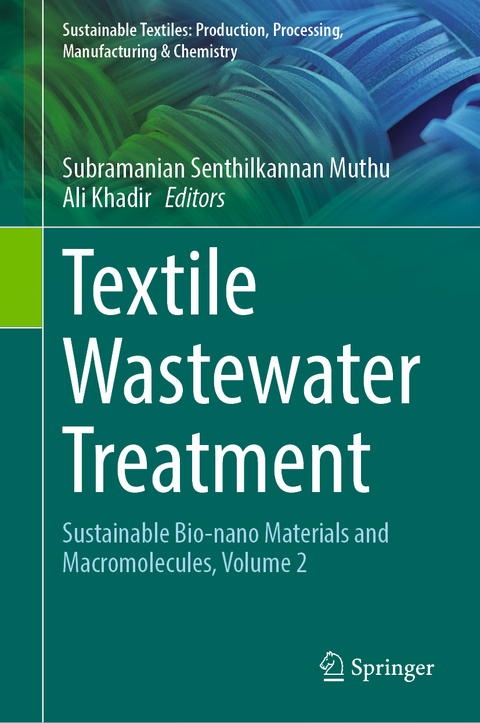
Textile Wastewater Treatment
Springer Verlag, Singapore
978-981-19-2851-2 (ISBN)
Dr. Subramanian Senthilkannan Muthu currently works for SgT Group as Head of Sustainability, and is based out of Hong Kong. He earned his PhD from The Hong Kong Polytechnic University, and is a renowned expert in the areas of Environmental Sustainability in Textiles & Clothing Supply Chain, Product Life Cycle Assessment (LCA) and Product Carbon Footprint Assessment (PCF) in various industrial sectors. He has five years of industrial experience in textile manufacturing, research and development and textile testing and over a decade's of experience in life cycle assessment (LCA), carbon and ecological footprints assessment of various consumer products. He has published more than 100 research publications, written numerous book chapters and authored/edited over 100 books in the areas of Carbon Footprint, Recycling, Environmental Assessment and Environmental Sustainability. Ali Khadir is an environmental engineer and a member of the Young Researcher and Elite Club, Islamic Azad University of Shahre Rey Branch, Tehran, Iran. He has published several articles and book chapters in reputed international publishers. He also has been the reviewer of journals and international conferences. His research interests center on emerging pollutants, dyes, and pharmaceuticals in aquatic media, advanced water and wastewater remediation techniques and technology.
Treatment of textile wastewater by nanoparticles.- Magnetic-based biocomposites in dye adsorption.- Application of wheat bran/straw-based biomaterials in textile wastewater.- Application of peel-based biomaterials in textile wastewater.- Applications of Luffa Based Biomaterials in Textile Wastewater.- Recent Trends in Textile Wastewater Treatment using Agricultural Waste.- Application of Agricultural Waste in Anionic Dyes Removal from Wastewater.- Application of Composite Polymeric Membranes in Textile Wastewater.- Chitosan and Chitosan-based Nanocomposite Membranes in the Removal of Synthetic Dye from Effluent Wastewaters.- Application of Biobased and Inorganic Composite Materials to Remove Heavy Metals from Textile Effluent.- Potential of pyrolysis biochar as an eco-friendly biosorbent for dye removal from industrial wastewaters.- Application of Rice Husk-Based Biomaterial in Textile Wastewater Treatment.- Application of Hydroxyapatite in Textile Wastewater.
| Erscheinungsdatum | 24.08.2022 |
|---|---|
| Reihe/Serie | Sustainable Textiles: Production, Processing, Manufacturing & Chemistry |
| Zusatzinfo | 30 Illustrations, color; 12 Illustrations, black and white; VII, 272 p. 42 illus., 30 illus. in color. |
| Verlagsort | Singapore |
| Sprache | englisch |
| Maße | 155 x 235 mm |
| Themenwelt | Naturwissenschaften ► Biologie ► Ökologie / Naturschutz |
| Naturwissenschaften ► Geowissenschaften ► Hydrologie / Ozeanografie | |
| Technik ► Maschinenbau | |
| ISBN-10 | 981-19-2851-7 / 9811928517 |
| ISBN-13 | 978-981-19-2851-2 / 9789811928512 |
| Zustand | Neuware |
| Haben Sie eine Frage zum Produkt? |
aus dem Bereich


